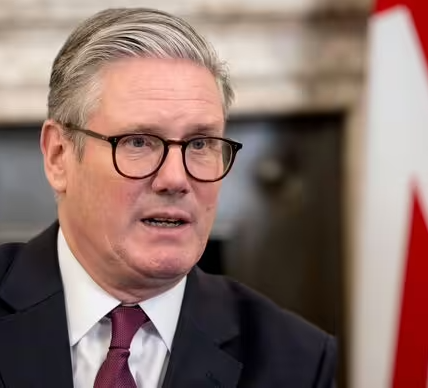Labour insisted tax rises will not impact working people – as Sir Keir Starmer vowed not to raise income tax, VAT or national insurance.

Keir Starmer has given a hint on where tax hikes will fall (Image: Getty)
Sir Keir Starmer has admitted people who own shares and assets “wouldn’t come within my definition of working people”.
The Prime Minister, giving his clearest indication yet of who may be hit with punishing tax hikes in next week’s Budget, said he believed a working person was somebody who “goes out and earns their living, usually paid in a sort of monthly cheque”.
But they do not have the ability to “write a cheque to get out of difficulties”, he said.
Labour insisted tax rises will not impact working people – as he vowed not to raise income tax, VAT or national insurance.

Keir Starmer is finally starting to admit where taxes will be increased (Image: Getty)
Asked whether he would classify a working person as someone whose income derived from assets, such as shares or property, the prime minister said: “Well, they wouldn’t come within my definition.”
Pressed on whether that meant taxes for those people could go up, the prime minister said: “You can probably give me any number of examples… you’re asking me for a definition of who’s a working person, and then you’re making assumptions about what that tax might be in relation to.”
Inheritance tax, charged on the estate of someone who has died, and capital gains tax, imposed on the profit from the sale of capital assets, have been touted as the two most likely to see a rise.
Asked if he thinks entrepreneurs may want to leave the UK following the reported tax increases, Sir Keir told reporters: “There is no reason for them to.”
Labour’s election manifesto said the party would not increase taxes on working people and included a commitment not to increase national insurance, income tax or VAT.
The Chancellor said she faced difficult choices but insisted her Budget would “begin to fix the NHS and start to rebuild our economy”.
The cost of Government borrowing increased in response to speculation the Chancellor would change debt rules to spend billions more on investments.
Tory former chancellor Jeremy Hunt said increased borrowing could increase the cost of mortgages for hundreds of thousands of households.
During a round of broadcast interviews while attending the International Monetary Fund meeting in Washington DC, Ms Reeves confirmed a technical change in the way she would measure progress against the target of managing debt.
Writing in the Financial Times, Ms Reeves said her fiscal rules would be “the rock of stability at the core of my Budget”.
Labour’s 2024 election manifesto said Ms Reeves would follow two rules: The current budget would be in balance so that day-to-day costs are met by revenues.
The second rule is that debt must be falling as a share of the economy by the fifth year of the economic forecast.
On Thursday she confirmed that the way debt is measured as part of that target would be changed to allow greater flexibility.
Ms Reeves said: “My fiscal rules will do two things. The first and most important: my stability rule will mean that day-to-day spending will be matched by revenues.
“Given the state of the public finances and the need to invest in our public services, this rule will bite hardest.
“Alongside tough decisions on spending and welfare, that means taxes will need to rise to ensure this rule is met. I will always protect working people when I make these choices, while taking a balanced approach.
“Crucially, my stability rule will also cover the interest on our national debt and unlike the previous government I won’t cut capital budgets to make up for shortfalls in the day-to-day running costs of departments.
“My second fiscal rule, the investment rule, will get debt falling as a proportion of our economy.
“That will make space for increased investment in the fabric of our economy, and ensure we don’t see the falls in public sector investment that were planned under the last government.”
She told ITV News: “Our second rule, our investment rule, will change the way in which we measure government debt so we take into account our assets not just the costs of investment.”
She is expected to target public sector net financial liabilities (PSNFL) as her new benchmark for government debt rather than the current measure of underlying public sector net debt.
A shift to PSNFL would give her greater headroom to meet her debt reduction target, because it includes a wider mix of state assets and liabilities – notably including expected student loan repayments to offset some of the liability.
Had PSNFL been used as the debt target in the March 2024 budget, the “headroom” – the margin by which the fiscal rule is met – would have increased by £53 billion according to the Institute for Fiscal Studies.




